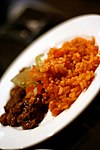Guajolota: Difference between revisions
No edit summary |
No edit summary |
||
| Line 16: | Line 16: | ||
}} |
}} |
||
'''Guajolota''' {{IPA-es|waːxoːloːta|}} also known as a '''[[torta]] de [[tamal]]''' is a form of street food commonly found in [[Mexico City]] and within the [[State of Mexico]]. It is essentially a sandwich composed of a [[tamal]] placed inside a ''[[bolillo]]'' or ''[[telera]]'' |
'''Guajolota''' {{IPA-es|waːxoːloːta|}} also known as a '''[[torta]] de [[tamal]]''' is a form of street food commonly found in [[Mexico City]] and within the [[State of Mexico]]. It is essentially a sandwich composed of a [[tamal]] placed inside a ''[[bolillo]]'' or ''[[telera]]'', which is a rounder version of a bolillo.<ref>{{cite book | title = Food Culture in Mexico | authors= Janet Long-Solis & Luis Alberto Vargas | publisher = Greenwood Press | location= Westport, Connecticut (USA) |url = | date = 2005 | page = 135 | isbn = 9780313324314 }}</ref> Vendors are commonly found selling tortas de tamal near offices, markets, schools, and particularly near churches on Sunday mornings. |
||
Most vendors sell a variety of tamales stuffed with different ingredients, such as red [[Mole sauce|mole]] with chicken or [[Salsa verde (Mexico)|Mexican ''salsa verde'']] with pork, to go along with the bolillo. |
|||
Guajolotas are frequently bought with a hot drink known as ''[[atole]]''. |
|||
In the ''guajolotas'' range is also the ''tamal guajolota'' in [[Oaxaca]] state. Part of the tradition is to drink hot ''[[atole]]'' when eating a ''guajolota''. There are several flavors of ''atole'', for example vanilla, chocolate, rice and [[guava]]. {{citation needed|date = October 2012}} |
|||
The term guajolota is the feminized version of the word guajolote, which originates from the [[Nahuatl]] word huexolotl or uexolotl, for [[Meleagrididae|turkey]]. Turkeys are called guajolotes throughout [[Mexico]] and most Central American countries like [[El Salvador]] and [[Guatemala]]. However the term is interchangeable with pavo which is the common Spanish word for turkey. |
|||
This popular meal is usually eaten by workers as an early breakfast due to its ability to make people feel with a full stomach. |
|||
The name Guajolotera derives from the word Guajolote, which is Spanish for Turkey. |
|||
==See also== |
==See also== |
||
Revision as of 04:00, 24 September 2016
 | |
| Type | Sandwich |
|---|---|
| Place of origin | Mexico |
| Region or state | Mexico City |
| Main ingredients | Bolillo or telera, tamal |
Guajolota [waːxoːloːta] also known as a torta de tamal is a form of street food commonly found in Mexico City and within the State of Mexico. It is essentially a sandwich composed of a tamal placed inside a bolillo or telera, which is a rounder version of a bolillo.[1] Vendors are commonly found selling tortas de tamal near offices, markets, schools, and particularly near churches on Sunday mornings. Most vendors sell a variety of tamales stuffed with different ingredients, such as red mole with chicken or Mexican salsa verde with pork, to go along with the bolillo.
Guajolotas are frequently bought with a hot drink known as atole.
The term guajolota is the feminized version of the word guajolote, which originates from the Nahuatl word huexolotl or uexolotl, for turkey. Turkeys are called guajolotes throughout Mexico and most Central American countries like El Salvador and Guatemala. However the term is interchangeable with pavo which is the common Spanish word for turkey.
See also
References
- ^ Food Culture in Mexico. Westport, Connecticut (USA): Greenwood Press. 2005. p. 135. ISBN 9780313324314.
{{cite book}}: Cite uses deprecated parameter|authors=(help)












